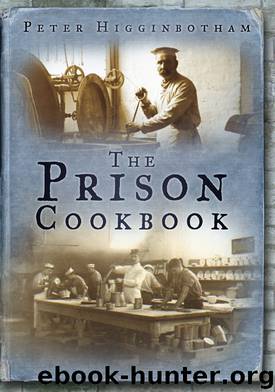The Prison Cookbook by Peter Higginbotham

Author:Peter Higginbotham
Language: eng
Format: epub
ISBN: 9780752496795
Publisher: The History Press
Published: 2013-05-24T16:00:00+00:00
NATIONALISATION
Although the 1865 Prison Act brought local prisons under some degree of central control, they were still funded by local rates, with local JPs playing a part in their administration. The final step in creating an integrated national prison system came with the 1877 Prison Act which placed control of all prisons in the hands of a new body known as the Prison Commissioners. At the same time, the Exchequer took over all the costs of running the prison system.
The nationalisation of the prisons aimed to make the operation of the penal system both uniform and economical. To this end, the Commissioners, chaired by Sir Edmund Du Cane, set about rationalising the country’s stock of 113 prisons. In the summer of 1878, forty-five were shut down – mostly small town gaols, although eleven county prisons were closed. The remainder provided space for 24,812 inmates – about 4,000 more than the expected requirements. 173
Unlike its predecessor in 1865, the new Act did not include detailed prison regulations. Instead, a new set of rules devised by the Prison Commissioners was introduced in April 1878. One innovation was a system of four stages through which convicted prisoners could progress during their sentence. In Stage 1, prisoners slept on a plank bed with no mattress. They were employed for ten hours a day in First Class hard labour, of which six to eight hours were to be on a crank- or tread-wheel. No money could be earned. In Stage 2, a mattress was provided for the plank bed on five nights a week. After completing a month of First Class hard labour, Stage 2 prisoners were moved to Second Class hard labour – light industrial work, for which a small payment could be earned. Stage 2 also offered inmates school instruction and a period of exercise on Sunday. Stage 3 reduced the bare plank bed to one night a week, allowed library books to be kept in cells and gave a higher rate of earning. Finally, at Stage 4, prisoners had a mattress every night and a further increase in earnings. More significantly, they could be given jobs of trust within the prison, have a visitor every three months and write and receive a letter.
Progress through the stages was achieved by the accumulation of marks, of which six to eight could be earned each day. Attaining a total of 224 marks (i.e. twenty-eight times eight) in a stage earned advancement to the following one, although idleness or misconduct could be punished by loss of earnings, stage privileges or even temporary demotion to an earlier stage.
Second Class labour covered a variety of tasks and could result in the learning of a trade that would make an inmate employable after release. At Manchester in 1886, the work for men included brush making and calico weaving, while women were occupied at knitting, sewing, cotton picking and making mail bags. 174 At Wakefield, the men’s employment included mat-making, stocking weaving and hammock making. Many of the goods produced
Download
This site does not store any files on its server. We only index and link to content provided by other sites. Please contact the content providers to delete copyright contents if any and email us, we'll remove relevant links or contents immediately.
The Vikings: Conquering England, France, and Ireland by Wernick Robert(81875)
Ali Pasha, Lion of Ioannina by Eugenia Russell & Eugenia Russell(40237)
The Conquerors (The Winning of America Series Book 3) by Eckert Allan W(37379)
The Vikings: Discoverers of a New World by Wernick Robert(36964)
Cecilia; Or, Memoirs of an Heiress — Volume 1 by Fanny Burney(32538)
Cecilia; Or, Memoirs of an Heiress — Volume 2 by Fanny Burney(31936)
Cecilia; Or, Memoirs of an Heiress — Volume 3 by Fanny Burney(31926)
Empire of the Sikhs by Patwant Singh(23069)
The Secret History by Donna Tartt(19034)
Hans Sturm: A Soldier's Odyssey on the Eastern Front by Gordon Williamson(18565)
Cat's cradle by Kurt Vonnegut(15326)
Pimp by Iceberg Slim(14479)
Sapiens: A Brief History of Humankind by Yuval Noah Harari(14358)
Talking to Strangers by Malcolm Gladwell(13342)
Norse Mythology by Gaiman Neil(13335)
Leonardo da Vinci by Walter Isaacson(13310)
4 3 2 1: A Novel by Paul Auster(12364)
Underground: A Human History of the Worlds Beneath Our Feet by Will Hunt(12082)
The Radium Girls by Kate Moore(12013)
